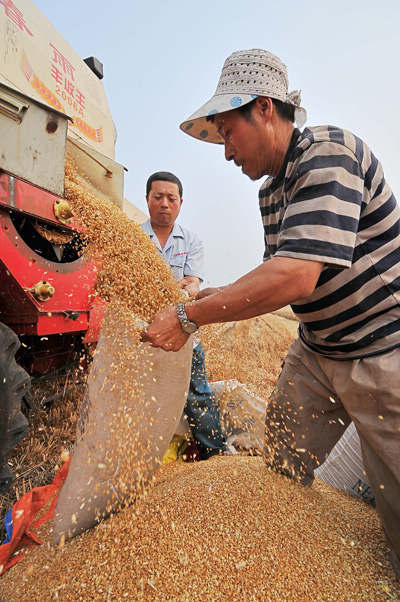|
 |
|
BUMPER HARVEST: Farmers in Liujia Village in Qingzhou City, east China's Shandong Province, use a mechanical thresher to harvest wheat on June 9, 2012 (WANG JILIN) |
Dongfu Group in Jilin City of northeast China's Jilin Province cooperated with a local village to grow and process rice, employing more than 90 percent of villagers and raising their annual per-capita income to 18,000 yuan ($2,893).
Liu Yandong, Chairman of Dongfu Group, said, "Rents from the transferred land only account for a small portion of farmers' income. A larger part of their income comes from dividends after their land is turned into stock shares for our group."
Zhang Xueqi, a grain grower in Xindai Township, Pinghu City of east China's Zhejiang Province, planted 13 hectares of wheat last year, but bad weather hindered him from harvesting, threatening huge losses.
The Xinlian Food and Oil Cooperative, established in June 2011, came to Zhang's rescue. Xinlian is the largest co-op in Pinghu. Head of Xinlian Gu Chunmei said Xinlian had invested altogether 40 million yuan ($6.4 million) in providing necessary services to farmers and facilitating farmwork.
Wang Hailing, a 57-year-old farmer in Hongsi Village, Shunyi District of Beijing, made a living on a farm before an international flower center was established in the district, which forever altered her way of life. She now leads a life like an urban citizen, working in the center and receiving a monthly salary. What makes her extremely pleased is that she is now covered by the five types of social insurance.
With the help of a rural cooperative, He Hanxiu, a farmer in Zhifeng Township of Dazu County in the west of Chongqing Municipality can now receive 2,400 yuan ($386) per year for renting her land, and by working at the vegetable center near her home, she can earn more than 1,000 yuan ($161) every month. She said that the rural cooperative has increased her income.
Vice Premier Hui Liangyu stressed last July that rural cooperatives performed important roles in modernizing agriculture, increasing farmers' income and boosting the rural economy.
"The rural cooperatives satisfy farmers' wishes to cooperate and potentially chart a course for reform of the agricultural management system," Hui said. "Rural cooperatives should be further developed to reduce production costs and improve efficiency. "
Co-ops Boost Rural Economies
- A law governing rural cooperatives was implemented on July 1, 2007, with the purpose of protecting the legal rights of rural cooperatives and their members and promoting the development of agriculture and rural economy.
- Currently, there are over 600,000 legally registered rural cooperatives. More than 43 million families have joined cooperatives, accounting for 17.2 percent of rural families, and those who do enjoy incomes 20 percent higher than those who do not.
- An additional 28,000 miscellaneous rural economic organizations provide services to 110 million rural families and form the main body of agricultural production. Revenues of leading rural companies now hit 5.7 trillion yuan ($916 billion), producing one-third of agricultural products in the Chinese market.
Email us at: tangyuankai@bjreview.com | 